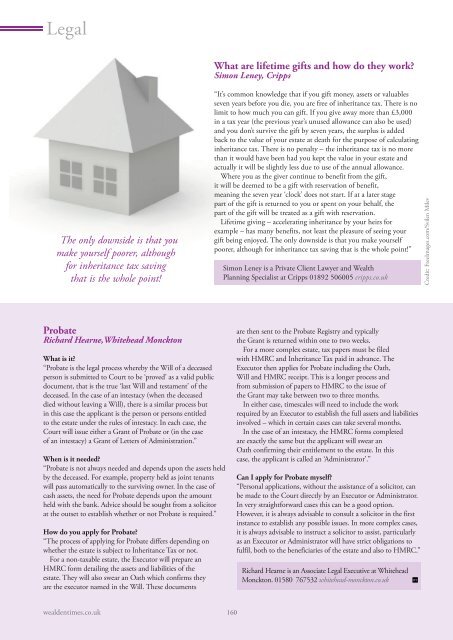Wealden Times | WT184 | June 2017 | Kitchen & Bathroom supplement inside
Wealden Times - The lifestyle magazine for the Weald
Wealden Times - The lifestyle magazine for the Weald
You also want an ePaper? Increase the reach of your titles
YUMPU automatically turns print PDFs into web optimized ePapers that Google loves.
Legal<br />
What are lifetime gifts and how do they work?<br />
Simon Leney, Cripps<br />
The only downside is that you<br />
make yourself poorer, although<br />
for inheritance tax saving<br />
that is the whole point!<br />
“It’s common knowledge that if you gift money, assets or valuables<br />
seven years before you die, you are free of inheritance tax. There is no<br />
limit to how much you can gift. If you give away more than £3,000<br />
in a tax year (the previous year’s unused allowance can also be used)<br />
and you don’t survive the gift by seven years, the surplus is added<br />
back to the value of your estate at death for the purpose of calculating<br />
inheritance tax. There is no penalty – the inheritance tax is no more<br />
than it would have been had you kept the value in your estate and<br />
actually it will be slightly less due to use of the annual allowance.<br />
Where you as the giver continue to benefit from the gift,<br />
it will be deemed to be a gift with reservation of benefit,<br />
meaning the seven year ‘clock’ does not start. If at a later stage<br />
part of the gift is returned to you or spent on your behalf, the<br />
part of the gift will be treated as a gift with reservation.<br />
Lifetime giving – accelerating inheritance by your heirs for<br />
example – has many benefits, not least the pleasure of seeing your<br />
gift being enjoyed. The only downside is that you make yourself<br />
poorer, although for inheritance tax saving that is the whole point!”<br />
Simon Leney is a Private Client Lawyer and Wealth<br />
Planning Specialist at Cripps 01892 506005 cripps.co.uk<br />
Credit: FreeImages.com/Svilen Milev<br />
Probate<br />
Richard Hearne,Whitehead Monckton<br />
What is it?<br />
“Probate is the legal process whereby the Will of a deceased<br />
person is submitted to Court to be ‘proved’ as a valid public<br />
document, that is the true ‘last Will and testament’ of the<br />
deceased. In the case of an intestacy (when the deceased<br />
died without leaving a Will), there is a similar process but<br />
in this case the applicant is the person or persons entitled<br />
to the estate under the rules of intestacy. In each case, the<br />
Court will issue either a Grant of Probate or (in the case<br />
of an intestacy) a Grant of Letters of Administration.”<br />
When is it needed?<br />
“Probate is not always needed and depends upon the assets held<br />
by the deceased. For example, property held as joint tenants<br />
will pass automatically to the surviving owner. In the case of<br />
cash assets, the need for Probate depends upon the amount<br />
held with the bank. Advice should be sought from a solicitor<br />
at the outset to establish whether or not Probate is required.”<br />
How do you apply for Probate?<br />
“The process of applying for Probate differs depending on<br />
whether the estate is subject to Inheritance Tax or not.<br />
For a non-taxable estate, the Executor will prepare an<br />
HMRC form detailing the assets and liabilities of the<br />
estate. They will also swear an Oath which confirms they<br />
are the executor named in the Will. These documents<br />
are then sent to the Probate Registry and typically<br />
the Grant is returned within one to two weeks.<br />
For a more complex estate, tax papers must be filed<br />
with HMRC and Inheritance Tax paid in advance. The<br />
Executor then applies for Probate including the Oath,<br />
Will and HMRC receipt. This is a longer process and<br />
from submission of papers to HMRC to the issue of<br />
the Grant may take between two to three months.<br />
In either case, timescales will need to include the work<br />
required by an Executor to establish the full assets and liabilities<br />
involved – which in certain cases can take several months.<br />
In the case of an intestacy, the HMRC forms completed<br />
are exactly the same but the applicant will swear an<br />
Oath confirming their entitlement to the estate. In this<br />
case, the applicant is called an ‘Administrator’.”<br />
Can I apply for Probate myself?<br />
“Personal applications, without the assistance of a solicitor, can<br />
be made to the Court directly by an Executor or Administrator.<br />
In very straightforward cases this can be a good option.<br />
However, it is always advisable to consult a solicitor in the first<br />
instance to establish any possible issues. In more complex cases,<br />
it is always advisable to instruct a solicitor to assist, particularly<br />
as an Executor or A dministrator will have strict obligations to<br />
fulfil, both to the beneficiaries of the estate and also to HMRC.”<br />
Richard Hearne is an Associate Legal Executive at Whitehead<br />
Monckton. 01580 767532 whitehead-monckton.co.uk<br />
wealdentimes.co.uk<br />
160


















